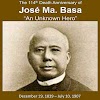A large part of the Mount Kanla-on Natural Park is now heavily occupied with permanent settlers, who are also dependent on it for livelihood, mostly agriculture-based.
Thousands of these occupants are found within the four-kilometer radius from the active crater of Kanla-on Volcano, which has been declared by the Philippines Institute of Volcanology and Seismology as a permanent danger zone.
This is particularly true in sites covered by MKNP in La Castellana, Canla-on and San Carlos. There is a question if this occupancy shall be tolerated, or any alternative action can be done, such as resettlement, given the likely impacts in the event of volcanic eruption.
Resettlement is not easy, but it is feasible if only the government would be serious in offering best alternatives to MKNP occupants. It may entail a huge amount of money and require a lot of negotiations. I am sure many would react negatively to the resettlement proposal and it may take a long time.
If this option may not be feasible at all, then the disaster preparedness of communities shall be enhanced and integrated into local development plans of LGUs covering MKNP. It should be noted that most of these occupants qualify for a land tenure security in MKNP.
There should be regular dry runs and drills among the different communities, and safe evacuation centers must be ready and prepared at all times. Although this may not be the safe choice given that the volcanic permanent danger zone should supposedly be free from settlement and other activities of the people, we can’t do otherwise if the decision is not acceptable to all. Let us just hope that Kanla-on Volcano will behave the way it is now.
There is a pending challenge, however, on how to prevent additional occupancy in MKNP, especially so that it is a declared protected area and a Key Biodiversity Area of the Philippines, too. Actually, in MKNP it is not so much of a question of additional people migrating in the area, but the main concern is the increasing population within the PA, because some children of main occupants tend to have their own family and raise children inside MKNP.
Increasing population has a direct impact in MKNP, because it would mean additional lands for housing and agriculture, and more pressures in the remaining natural resources for food, timber requirements and livelihood, that may trigger further conversion of the remaining forests. It is in this context that the improved basic social services should be made available to MKNP occupants. It is important to promote and implement reproductive health programs and provide other health services and education in MKNP. In most cases, educated children decided to work and settle outside the PA.
The other equally important measure that should be addressed is the land tenure of communities inside MKNP. To date, these occupants are considered informal settlers because they don’t have any security over the land they are actually occupying. Republic Act 9154, or the Mount Kanla-on Natural Park of 2001, that declared MKNP as a final protected area of the Philippines, grants that tenured migrants can avail land tenure in the PA. Tenured migrants are those members of households that have actually and continuously occupied the MKNP since June 1, 1987, and are solely dependent in the area for their livelihood.
The purpose of this tenure is to provide social fence that would prevent further encroachment in MKNP. As a matter of approach, the tenure instrument must be community-based, limited solely to multiple-use zones, promote clustering and comply with the management plan and zoning of MKNP. Each household shall be allocated for a maximum of three hectares of areas they are actually occupying and cultivating.
Tenured migrants shall have then the obligations to participate in the protection and rehabilitation of MKNP. It is by this reason that the Protected Area Management Board of MKNP shall fast track the issuance of land instrument to tenured migrants so that their participation in PA management shall be further solicited and galvanized.*










0 Comments